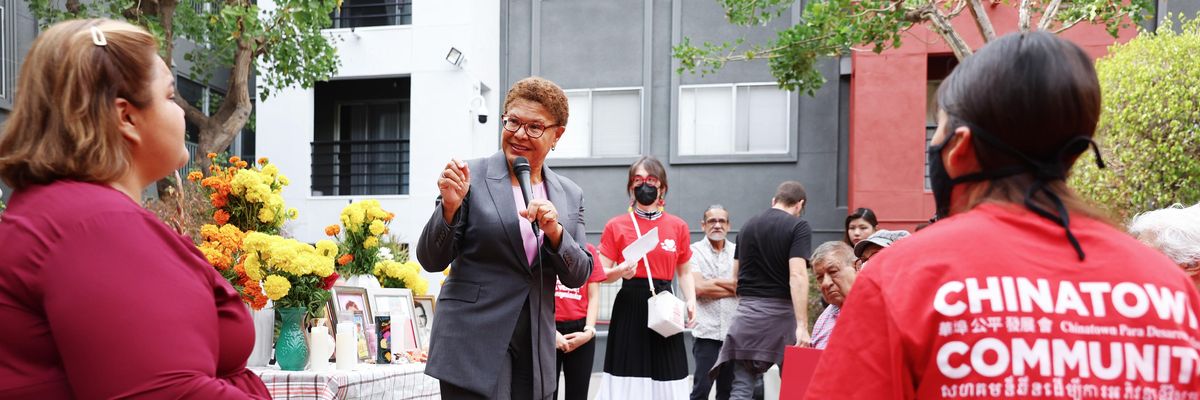Today, voters will cast ballots in one of the most critical elections in recent history. Conspicuously absent from coverage despite its priority for many voters is housing. Half of Americans struggle with housing insecurity, unable to find affordable housing for their families, cover rent increases, or protect themselves from illegal harassment and evictions. In major cities like Los Angeles, the housing and homelessness crises consistently rank as the top issue on voters' minds.
Across the country, local candidates and elected officials refuse to entertain strong proposals to change the status quo, inevitably owing to the outsized influence of real estate industry donations on local elections. According to watchdog site OpenSecrets, real estate industry groups have already spent over $187 million nationally during this election cycle, and over $419 million during the 2020 presidential election. Of course, their influence shapes policy long after election day.
Proposals in Los Angeles, Florida, and Denver are smart, grassroots-driven, people-first local solutions that place the needs of communities over profiteering and greed.
In Los Angeles, recently leaked recordings featuring three city councilmembers and the local labor federation president reveal how many elected leaders talk when they believe no one is listening. Amidst racist and anti-indigenous remarks, the leaders discussed putting a fourth councilmember's renter-heavy district "in a blender." The district was eventually redistricted to weaken renters' power.
Frustrated with government inaction, activists and housing experts have taken matters into their own hands. Housing measures on the midterm ballot--with notable examples in California, Florida, and Colorado--have largely flown under the radar in national media, but would have as big, if not greater, impacts on people's daily lives as candidate races. These transformative initiatives go beyond traditional policy approaches that rely on market fixes like vouchers, tax incentives, or zoning.
Back in Los Angeles, sixty percent of renters spend more than one third of their paycheck on rent. Forty-two thousand students, workers and seniors live under bridges, on sidewalks, or in shelters. A broad coalition of 230 housing experts, homelessness service providers, community organizations and labor unions have placed Measure ULA on the ballot. An innovative approach that pairs affordable development with homelessness prevention, ULA would add acquisition of existing buildings and social housing including community land trusts and housing co-ops to traditional affordable housing construction. It would also provide direct income assistance for seniors and people with disabilities and legal counsel to tenants facing eviction. If passed, Measure ULA would be overseen by a citizens committee, and paid for by a one-time tax on multimillion dollar real estate sales.
On the other side of the country, communities in Florida are at the epicenter of a similar housing emergency. Rent in metro Orlando has jumped 30 percent overall, ans 60 percent in some neighborhoods. Yet corporations are raking in profits while Floridians are priced out of the state. Guided by the fundamental principle that everyone deserves access to safe, accessible, affordable housing, activists with Florida Rising are pushing for the Orange County Rent Stabilization Ordinance, a temporary one-year measure which would cap rent increases for more than 100,000 rental properties with 4 or more units at the Consumer Price Index, a measure of inflation currently at 9.8%.
In Denver, a ballot initiative is just days away from ensuring the right to counsel for renters. Denver's Initiated Ordinance 305--also known as No Eviction Without Representation (NEWR)--would provide free, universal access to legal counsel for Denver renters facing eviction. This would, in turn, stop unjust evictions and reduce homelessness. Over 9,000 evictions are filed annually in Denver, and that number is creeping towards pre-eviction levels. However, half of evictions fail in court when renters have legal support.Under the current system, renters only have representation 1% of the time, often losing cases that were legally theirs to win, compared to over 90% of landlords. This rings true nationally as well--in eviction cases, only 3 percent of tenants nationwide are represented, compared to 81 percent of landlords. A victory for Denver's Initiative 305 would ensure that renters get the due process they deserve on a playing field that has long been anything but level.
Ballot initiatives like these can break legislative logjams, cut through real estate industry influence, and give voice to citizens angry with slow and hidebound legislators. They can also attract significant opposition from the real estate industry.
The LA ballot measure is opposed by large property owners and real estate interests who have amassed over $5 million to defeat it. Florida Rising and their partners face stiff opposition from the Florida Apartment Association and the Florida Realtors Association, who have not only spent millions to oppose the proposed ordinance but have sued Orange County to get it removed from the ballot (the matter remains unresolved with voting already started). And NEWR Denver's 100% volunteer-run campaign faces steep opposition fundraising, whose average donation is 1500 times larger than theirs.
The proposals in Los Angeles, Florida, and Denver are smart, grassroots-driven, people-first local solutions that place the needs of communities over profiteering and greed. But they are just a small step towards true affordability, equity, and justice in the housing industry. We live in one of the wealthiest countries in the world, yet our current housing system denies so many hard-working people basic dignity, stability, or safety. Now that the pandemic has so sharpened the housing crisis, we should expect to see more citizen-led initiatives like this in the face of inaction from state, local, and federal politicians.

